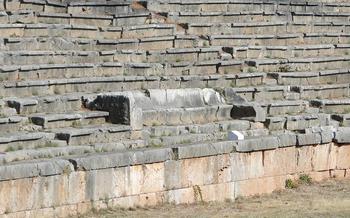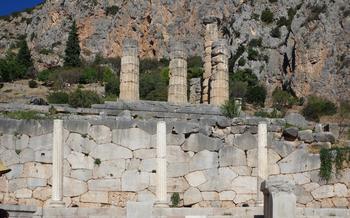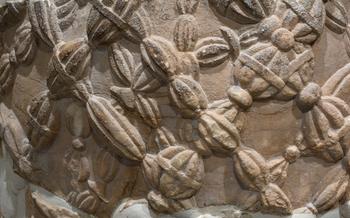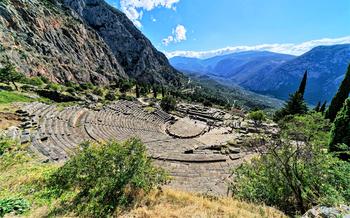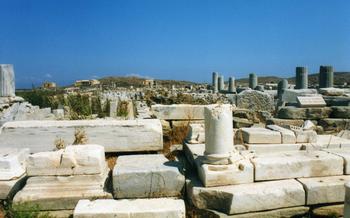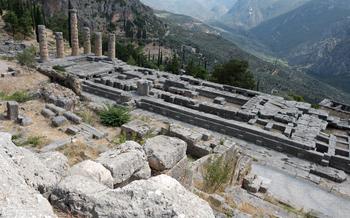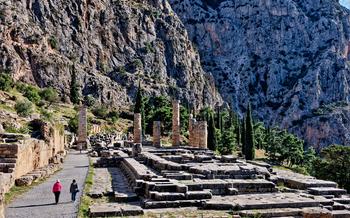
The Delphi Handicrafts Museum
- Historical Significance
- Archaeological Site
- Delphi Museum
- The Delphi Handicrafts Museum:
- Pottery and Ceramics
- Textiles and Weaving
- Metalwork and Jewelry
- Woodcarving and Sculpture
- Basketry and Straw Work:
- Leatherwork and Footwear
- Guided Tours and Workshops
- Souvenirs and Gifts
- Accessibility and Facilities
- Insider Tip
Historical Significance
Delphi, nestled in the folds of Mount Parnassus, was an ancient city of profound religious and political significance in the Greek world. Its fame stemmed from the oracle of Delphi, a sacred sanctuary dedicated to the god Apollo. The oracle, believed to be the mouthpiece of the divine, issued prophecies that influenced decisions and shaped the destinies of individuals, cities, and entire nations. Delphi's influence extended beyond religious matters; it was also a major political center, hosting the Pythian Games, one of the four Panhellenic Games, and serving as a meeting place for the Amphictyonic League, a council of Greek city-states. During the Peloponnesian War, Delphi played a pivotal role, siding with Sparta and providing financial support to the Spartan cause. However, with the rise of the Roman Empire, Delphi's influence waned, and it gradually declined, eventually falling into obscurity after the Roman conquest.
Archaeological Site
The archaeological site of Delphi is a sprawling complex located on the slopes of Mount Parnassus. It was once a thriving city that served as a religious and political center for the ancient Greeks. The site is dominated by the Temple of Apollo, an impressive structure that was built in the 6th century BC. The temple housed the oracle of Delphi, which was believed to be the voice of the god Apollo. Visitors can also see the Treasury buildings, which were built by various city-states to store their offerings to the oracle. Other notable structures include the theater, stadium, and Tholos, which was a circular building used for religious ceremonies. Ongoing archaeological excavations continue to uncover new treasures and shed light on the ancient city's rich history.
Delphi Museum
The Delphi Museum is a treasure trove of ancient artifacts that provide a glimpse into the rich history and culture of Delphi. The museum's collection includes sculptures, pottery, jewelry, and other objects that were excavated from the archaeological site. Among the highlights of the collection is the bronze statue of the Charioteer, a masterpiece of ancient Greek sculpture that dates back to the 5th century BC. The statue depicts a victorious charioteer standing in his chariot, and it is considered one of the finest examples of Greek bronze casting.
The museum also houses a significant collection of pottery, including vases, amphorae, and other vessels that were used for everyday purposes as well as for religious rituals. The pottery exhibits showcase the development of Greek pottery styles, from the geometric period to the Hellenistic period. Visitors can admire the intricate designs and motifs that adorned these vessels, which provide valuable insights into the artistic traditions of ancient Greece.
The Delphi Museum is an essential stop for anyone interested in ancient Greek history and culture. The museum's collection is beautifully displayed and well-curated, and it offers a comprehensive overview of the archaeological treasures of Delphi. The museum also offers educational programs and guided tours that enhance the visitor experience and provide deeper insights into the significance of the artifacts.
The Delphi Handicrafts Museum:
The Delphi Handicrafts Museum, nestled amidst the picturesque town of Delphi, is a treasure trove of traditional Greek craftsmanship. Dedicated to preserving and showcasing the rich heritage of Greek artisans, the museum houses an impressive collection of handcrafted objects that reflect the creativity and skill of local craftsmen and women. As you step through its doors, you will be greeted by a vibrant display of pottery, textiles, metalwork, woodcarving, basketry, leatherwork, and footwear, each piece a testament to centuries of tradition and artistry.
This museum is not just a repository of artifacts; it is a living testament to the enduring spirit of Greek craftsmanship. Through its interactive exhibits and workshops, the museum offers visitors a unique opportunity to witness traditional techniques firsthand and even try their hand at creating their own crafts. Whether you're an art enthusiast, a history buff, or simply someone who appreciates the beauty of handmade goods, the Delphi Handicrafts Museum is a must-visit destination that will leave you inspired and amazed.
Pottery and Ceramics
The art of pottery and ceramics has a significant place in Greek history and culture, dating back to ancient times. Ancient Greek pottery was not only functional but also highly artistic, with a variety of styles and techniques. The most famous styles include red-figure and black-figure pottery, both of which feature intricate designs and scenes from mythology or everyday life. Notable pottery centers in Greece included Athens and Crete, which produced high-quality ceramics for both domestic use and export. The process of creating Greek pottery involved shaping the clay on a potter's wheel, decorating it with slip or paint, and then firing it in a kiln. This process has been passed down through generations, and many traditional techniques are still used by contemporary Greek potters.
Textiles and Weaving
In Greece, the art of weaving has flourished for millennia, leaving an enduring legacy of intricate patterns and vibrant textiles. From the ancient Minoan civilization on Crete to the present day, Greek weavers have crafted beautiful fabrics using various natural fibers such as wool, cotton, and silk.
Traditional Greek textiles are renowned for their distinctive designs and motifs, often inspired by nature, mythology, and geometric patterns. One of the most recognizable motifs is the "meander," a continuous line that forms a repeating pattern, symbolizing the eternal flow of life. Other common motifs include stylized flowers, birds, and animals, as well as scenes from Greek mythology.
Notable weaving centers in Greece include Crete, known for its intricate wool rugs and tapestries, and Epirus, famous for its colorful woven blankets and shawls. Each region has its unique style and techniques, reflecting the diverse cultural heritage of Greece.
Greek textiles have gained international recognition for their exceptional quality and craftsmanship. Whether it's a finely woven rug, a delicate embroidered blouse, or a hand-spun scarf, Greek textiles embody the essence of Greek artistry and tradition.
Metalwork and Jewelry
The tradition of metalworking in Greece dates back to ancient times, with evidence of sophisticated gold and silver craftsmanship found in archaeological sites throughout the country. Greek metalworkers were renowned for their skill in creating intricate jewelry, sculptures, and utilitarian objects. In ancient Greece, metalworking was closely associated with the gods, and many metalworkers were believed to be under the patronage of Hephaestus, the god of fire and metalworking.
Today, the tradition of metalworking continues in Greece, with many artisans specializing in creating unique and beautiful pieces of jewelry and decorative items. Visitors to the Delphi Handicrafts Museum can admire a stunning collection of metalwork, including intricate gold and silver jewelry, as well as bronze sculptures and household objects. The museum's collection provides a glimpse into the rich history and artistry of Greek metalworking, and showcases the skill and creativity of contemporary Greek artisans.
Woodcarving and Sculpture
The tradition of woodcarving and sculpture in Greece dates back to ancient times, with evidence of intricate wooden sculptures found in archaeological sites throughout the country. Greek woodcarvers have a deep understanding of the natural beauty of wood, and their work often showcases the unique grain and texture of the material.
Olive wood and cypress are commonly used for carving, as they are both durable and have a beautiful finish. Woodcarvers use a variety of tools and techniques to create their sculptures, including chisels, gouges, and lathes. They often incorporate traditional Greek motifs and designs into their work, such as mythological figures, animals, and geometric patterns.
Notable woodcarving centers in Greece include Crete and Epirus, where skilled artisans continue to produce stunning works of art. Visitors to these regions can admire the intricate carvings on furniture, religious objects, and decorative items, which are often displayed in local museums and galleries.
Basketry and Straw Work:
Basketry and straw work hold a significant place in Greek tradition, dating back to ancient times. Skilled artisans have passed down techniques for generations, creating functional and decorative items using natural materials. In the Delphi Handicrafts Museum, visitors can explore the rich history and diversity of Greek basketry and straw work.
The museum showcases a variety of baskets, from simple utilitarian pieces to intricate works of art. Different regions of Greece have their own distinct styles and techniques, using materials such as straw, wicker, and reeds. Visitors can admire the intricate patterns and designs that adorn these baskets, each telling a story of the region's cultural heritage.
The museum also highlights the significance of basketry in everyday life. Baskets were used for various purposes, from storing and transporting goods to serving food and wine. They played a crucial role in agriculture, fishing, and other traditional occupations. By showcasing these objects, the museum provides a glimpse into the daily lives of ancient Greeks and their connection to nature.
Whether you're a history enthusiast, an art lover, or simply appreciate traditional craftsmanship, the Delphi Handicrafts Museum is a treasure trove of Greek basketry and straw work. It's a place where you can witness the skill and creativity of artisans who have preserved this ancient tradition for centuries.
Leatherwork and Footwear
The tradition of leatherworking and footwear in Greece dates back to ancient times, with evidence of skilled craftsmen creating sandals, boots, and other leather goods. In Delphi, the art of leatherworking continues to thrive, with artisans using traditional techniques to create high-quality leather products.
The Delphi Handicrafts Museum showcases a collection of leatherwork and footwear, demonstrating the skill and artistry of local craftsmen. Visitors can admire intricately designed shoes, handbags, belts, and other accessories, all made from fine-quality leather. The museum also hosts workshops and demonstrations, allowing visitors to learn about the process of leatherworking and even try their hand at creating their own leather goods.
Notable leatherworking centers in Greece include Athens and Crete, where artisans have passed down their skills through generations. In these regions, visitors can find a wide variety of leather products, from traditional sandals to modern handbags, all crafted with the same care and attention to detail that characterized ancient Greek leatherworkers.
Guided Tours and Workshops
To enhance your experience at the Delphi Handicrafts Museum, consider participating in a guided tour. Led by knowledgeable experts, these tours provide insightful commentary on the exhibits, traditional Greek handicrafts, and the history of the region. You'll gain a deeper understanding of the museum's collection and the significance of preserving traditional craftsmanship.
The museum also offers hands-on workshops, providing a unique opportunity to learn a new craft and create your own souvenir. Under the guidance of skilled artisans, you can try your hand at pottery, weaving, metalworking, or woodcarving. These workshops are suitable for visitors of all skill levels, allowing you to unleash your creativity and take home a personalized memento of your visit to Delphi.
Booking a guided tour or workshop in advance is recommended to secure your spot and avoid disappointment. Check the museum's website or inquire at the information desk for details on scheduling and availability. Participating in a workshop is an excellent way to immerse yourself in the world of traditional Greek handicrafts, learn new skills, and create a lasting memory of your time in Delphi.
Souvenirs and Gifts
The Delphi Handicrafts Museum offers a wonderful opportunity to purchase traditional Greek handicrafts as souvenirs and gifts. The museum shop is stocked with a wide variety of items, including pottery, textiles, jewelry, wood carvings, and leather goods. Each piece is handmade by skilled artisans, ensuring that you're taking home a unique and authentic souvenir.
By purchasing a handicraft from the museum shop, you're not only supporting local artisans but also helping to preserve traditional Greek craftsmanship. These crafts have been passed down from generation to generation, and the museum plays a vital role in ensuring their survival.
Whether you're looking for a small token of your visit to Delphi or a special gift for a loved one, you're sure to find something perfect at the Delphi Handicrafts Museum shop. So take your time browsing the collection and choose a souvenir that will remind you of your time in this beautiful and historic place.
Accessibility and Facilities
The Delphi Handicrafts Museum is committed to providing an accessible and welcoming environment for all visitors. Wheelchair ramps and elevators ensure that the museum is accessible for visitors with disabilities. Basic facilities such as restrooms, a café, and a gift shop are available for the convenience of visitors.
For those exploring the archaeological site of Delphi, comfortable shoes are recommended for walking on uneven surfaces. It's also advisable to bring water and sunscreen, especially during the hot summer months. Remember to pack a hat or sunglasses to protect yourself from the sun.
To make the most of your visit, consider joining a guided tour or participating in a hands-on workshop. Guided tours offer insights into the exhibits and traditional Greek handicrafts, while workshops provide a unique opportunity to learn a new craft and create your own souvenir. Booking these experiences in advance is recommended to secure your spot.
Insider Tip
For a truly immersive experience, time your visit to coincide with the annual Delphi Festival, held every August. This vibrant celebration showcases the best of Greek culture, with traditional music and dance performances, art exhibitions, and workshops. Immerse yourself in the lively atmosphere as you witness the rich heritage of Delphi come to life. Don't miss the chance to engage with local artisans, learn about their craft, and take home a unique souvenir that captures the essence of this captivating region.
